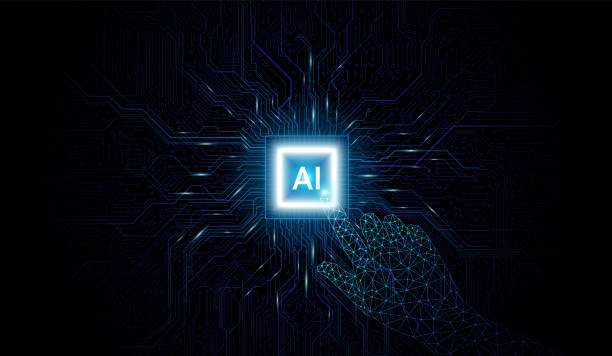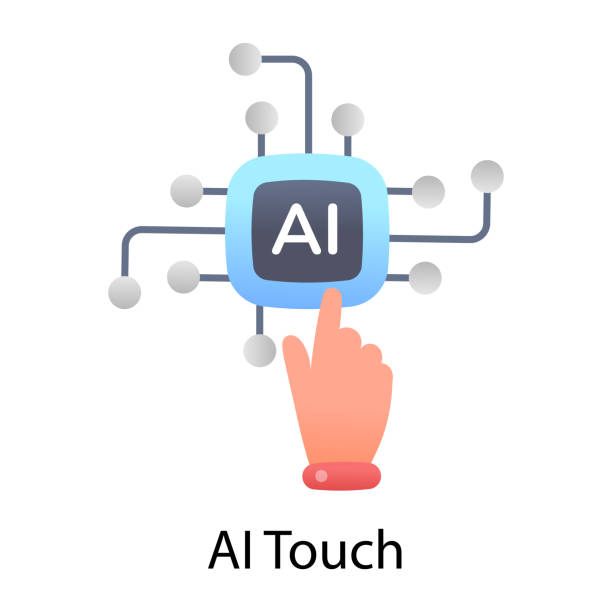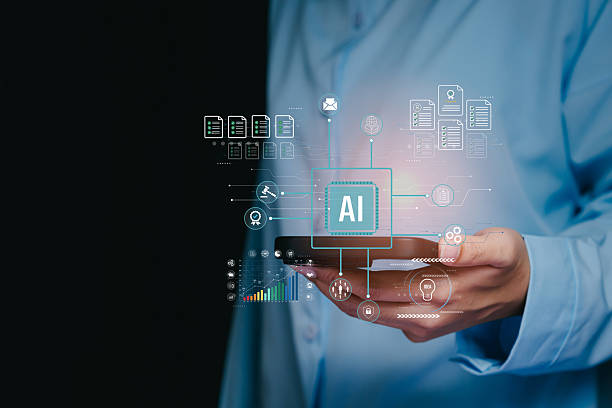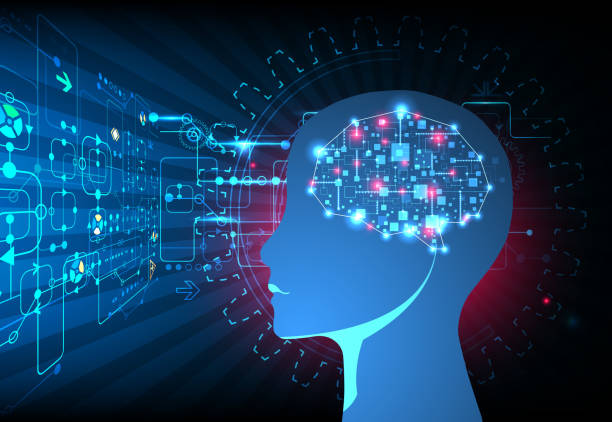What is Artificial Intelligence? Definitions and Basic Concepts

Artificial Intelligence (AI) is a branch of computer science that deals with building machines capable of performing tasks that typically require human intelligence.
These tasks include learning, reasoning, problem-solving, natural language understanding, and pattern recognition.
In other words, the goal of #Artificial_Intelligence is to create systems that can think, learn, and act as humans do.
There are various definitions for artificial intelligence, but one of the most common is John McCarthy’s definition, which considers it “the science and engineering of making intelligent machines.”
Artificial intelligence is essentially an attempt to simulate human cognitive processes in machines.
Basic concepts in artificial intelligence include Machine Learning, Neural Networks, Natural Language Processing, and Computer Vision.
Each of these concepts addresses a specific aspect of human intelligence and attempts to implement it in machines.
Is your online sales not meeting your expectations? With Rasaweb, solve the problem of low sales and poor user experience forever!
✅ Increase visitor-to-customer conversion rate
✅ Create a pleasant user experience and increase customer trust
⚡ Take action now to receive a free consultation!
History and Evolution of Artificial Intelligence
![]()
The history of artificial intelligence dates back to the 1950s, when researchers like Alan Turing and John McCarthy began exploring the possibility of building intelligent machines.
In 1956, the first artificial intelligence conference was held in Dartmouth, which is recognized as a milestone in the history of this science.
In the early decades, artificial intelligence faced many hopes, but due to hardware and software limitations, progress was slower than expected.
In the 1980s, with the emergence of expert systems, interest in artificial intelligence increased again, but these systems also faced limitations.
In the 2000s, with significant advances in hardware and algorithms, artificial intelligence entered a new era.
Deep Learning and deep neural networks have achieved excellent results in areas such as image recognition and natural language processing.
Today, artificial intelligence is transforming various industries, and its applications are expanding day by day.
#Artificial_Intelligence has transformed businesses.
Types of Artificial Intelligence and its Different Levels

Artificial intelligence can be divided into different types based on their abilities and functions.
One of the most common classifications is based on levels of intelligence, which includes:
1.
Narrow AI: This type of artificial intelligence is designed to perform a specific task and performs very well in that field.
Examples of narrow artificial intelligence include voice assistants like Siri and Alexa, facial recognition systems, and recommendation algorithms on social networks.
2.
General AI: This type of artificial intelligence has cognitive abilities similar to humans and can perform any task that a human can perform.
General artificial intelligence is still in the development stages and has not been fully realized.
3.
Super AI: This type of artificial intelligence surpasses human cognitive abilities and can outperform humans in all fields.
Super AI is a hypothetical concept and does not yet exist in practice.
In addition to classification based on levels of intelligence, artificial intelligence can also be divided based on learning methods.
Some common learning methods in artificial intelligence include supervised learning, unsupervised learning, reinforcement learning, and semi-supervised learning.
Click here for more information on the types of artificial intelligence.
| Type of Artificial Intelligence | Description | Example |
|---|---|---|
| Narrow AI | Focused on a specific task | Siri voice assistant |
| General AI | Cognitive abilities similar to humans | (Under development) |
| Super AI | Beyond human cognitive abilities | (Hypothetical) |
Machine Learning and its Role in Artificial Intelligence

Machine Learning is a subset of artificial intelligence that allows machines to learn from data without explicit programming.
In fact, instead of giving machines precise instructions, they are given data and information that they use to identify patterns and relationships and learn.
There are different methods for machine learning, including Supervised Learning, Unsupervised Learning, and Reinforcement Learning.
In supervised learning, the machine is trained using labeled data, while in unsupervised learning, the machine identifies patterns using unlabeled data.
In reinforcement learning, the machine learns how to perform a task in the best way by trial and error and receiving rewards or penalties.
Machine learning plays a very important role in the development of artificial intelligence because it allows machines to automatically acquire knowledge and improve their performance.
Today, machine learning is used in many fields such as facial recognition, natural language processing, fraud detection, and recommendation systems.
Do you know that your company’s website is the first impression customers have of your company? Multiply your business credibility with a powerful corporate website from Rasaweb!
✅ Exclusive and eye-catching design tailored to your brand
✅ Improve user experience and increase customer attraction
⚡ Get a free consultation!
Applications of Artificial Intelligence in Various Industries

Artificial intelligence is currently used in various industries and significantly improves work processes.
Some of the important applications of artificial intelligence in various industries include:
1.
Health and Treatment: Artificial intelligence is used in disease diagnosis, drug development, and providing personalized medical care.
Artificial intelligence systems can analyze medical images and diagnose diseases with greater accuracy.
Also, artificial intelligence can help in the development of new drugs and finding more effective treatments for diseases.
2.
Finance and Banking: Artificial intelligence is used in fraud detection, risk management, and providing personalized financial services.
Artificial intelligence systems can identify suspicious patterns in financial transactions and prevent fraud.
Also, artificial intelligence can help in assessing customers’ credit risk and providing appropriate financial services to them.
3.
Production and Industry: Artificial intelligence is used in automating production processes, quality control, and predicting equipment failure.
Smart robots can perform repetitive and dangerous tasks on production lines and increase productivity.
Also, artificial intelligence can predict equipment failure by analyzing sensor data and prevent production shutdowns.
4.
Transportation: Artificial intelligence is used in the development of self-driving cars, optimizing routes, and traffic management.
Self-driving cars can understand their surroundings and move without the need for a human driver by using sensors and artificial intelligence algorithms.
Also, artificial intelligence can optimize routes and prevent traffic by analyzing traffic data.
#Artificial_Intelligence has performed well in this section as well.
Challenges and Limitations of Artificial Intelligence

Despite the significant advances in the field of artificial intelligence, there are still challenges and limitations that need to be overcome.
Some of the most important challenges and limitations of artificial intelligence include:
1.
Need for a lot of data: Many artificial intelligence algorithms require a lot of data for training.
Collecting and labeling this data can be time-consuming and costly.
Especially in fields where sufficient data is not available, developing artificial intelligence systems can be difficult.
2.
Interpretability: Some artificial intelligence algorithms, such as deep neural networks, are very complex and it is difficult to understand how they work.
This can create problems in fields such as medicine and law, where artificial intelligence decisions need to be explainable and justifiable.
3.
Bias: Artificial intelligence algorithms can learn and reproduce biases present in training data.
This can lead to discrimination and inequality in artificial intelligence decisions.
For example, a facial recognition system may perform worse in recognizing the faces of people with dark skin tones.
4.
Ethical issues: The development of artificial intelligence raises new ethical issues, such as accountability for artificial intelligence decisions, data privacy, and the impact of artificial intelligence on employment.
It is necessary that these issues be seriously examined and appropriate solutions be provided.
Click here for more information about artificial intelligence ethics
The Future of Artificial Intelligence and its Impact on Human Life

The future of artificial intelligence looks very bright, and it is expected that this technology will have a profound impact on human life in the coming years.
Some of the most important potential impacts of artificial intelligence include:
1.
Automation of jobs: Artificial intelligence can automate many repetitive and routine jobs, which can lead to increased productivity and reduced costs.
However, this can also raise concerns about job loss and the need to retrain the workforce.
2.
Improving the quality of life: Artificial intelligence can help improve the quality of human life in various fields such as health and treatment, education, transportation, and entertainment.
For example, artificial intelligence systems can provide personalized medical care, customize education for each individual, make transportation safer and more efficient, and provide more entertaining experiences.
3.
Solving big problems: Artificial intelligence can help in solving major global problems such as climate change, poverty, and diseases.
For example, artificial intelligence systems can identify complex patterns in climate data and provide more accurate predictions of climate change.
Also, artificial intelligence can help in developing new methods for treating diseases and reducing poverty.
| Area | Impacts of Artificial Intelligence |
|---|---|
| Health and Treatment | Faster diagnosis, personalized treatments |
| Transportation | Self-driving cars, route optimization |
| Production | Automation, quality control |
Artificial Intelligence and Cybersecurity

Artificial intelligence plays an important role in improving cybersecurity.
Artificial intelligence-based systems can automatically identify and respond to cyber threats, predict vulnerabilities, and strengthen security systems.
One of the important applications of artificial intelligence in cybersecurity is intrusion detection.
Artificial intelligence-based intrusion detection systems can identify abnormal behaviors by analyzing network and system data and send necessary alerts to security managers.
These systems can identify cyber attacks in their early stages and prevent serious damage.
Artificial intelligence can also help in malware analysis.
Artificial intelligence-based malware analysis systems can automatically analyze malware code and identify its behavior.
These systems can provide important information about how malware works, its goals, and how to deal with it.
In addition, artificial intelligence can help in developing smarter and more effective antiviruses.
However, it should be mentioned that artificial intelligence can also be used by cyber attackers to carry out more complex and effective attacks.
Attackers can use artificial intelligence to create smarter malware, more targeted phishing, and more effective social engineering attacks.
Therefore, it is necessary that security systems also be continuously improved using artificial intelligence so that they can deal with new threats.
Are you dissatisfied with the low rate of converting visitors to customers on your online store?
Solve this problem forever with professional online store design by Rasaweb!
✅ Increase visitor-to-customer conversion rate
✅ Create a great user experience and build customer trust
⚡ Get a free consultation
The Impact of Artificial Intelligence on the Labor Market and New Job Opportunities

Artificial intelligence will have significant impacts on the labor market.
On the one hand, the automation of work processes can lead to the loss of some jobs, especially jobs that are repetitive and routine.
On the other hand, artificial intelligence will create new job opportunities in areas such as the development, implementation, maintenance, and management of artificial intelligence systems.
Some of the new jobs that are expected to be created with the development of artificial intelligence include:
1.
Data Scientist: Data scientists are responsible for collecting, analyzing, and interpreting data to develop and improve artificial intelligence systems.
They should have a good knowledge in fields such as statistics, machine learning, and programming.
2.
Machine Learning Engineer: Machine learning engineers are responsible for designing, implementing, and deploying machine learning models.
They should have a good knowledge in fields such as machine learning algorithms, deep learning frameworks, and cloud infrastructures.
3.
Artificial Intelligence Ethics Specialist: Artificial intelligence ethics specialists are responsible for examining the ethical issues related to the development and use of artificial intelligence.
They should have a good knowledge in fields such as philosophy, law, and social sciences.
4.
Robot Trainer: Robot trainers are responsible for training robots to perform various tasks.
They should have a good knowledge in fields such as robotics, artificial intelligence, and education.
To succeed in the future labor market, it is necessary for individuals to learn new skills and adapt to new technologies.
Focusing on skills such as problem-solving, critical thinking, creativity, and communication skills can help individuals succeed in the artificial intelligence-based world of work.
Click here to view a list of artificial intelligence-related jobs.
How Can We Use Artificial Intelligence in Everyday Life?

Artificial intelligence is currently present in many aspects of our daily lives, and using it can make our lives easier and more efficient.
Some of the ways we can use artificial intelligence in everyday life include:
1.
Using voice assistants: Voice assistants such as Siri, Alexa, and Google Assistant can help us with various tasks such as setting reminders, playing music, answering questions, and controlling smart home devices.
2.
Using recommendation systems: Recommendation systems exist on many websites and applications and can help us find products, movies, music, and content that we are interested in.
3.
Using language translation programs: Language translation programs can help us communicate with people who speak other languages.
4.
Using navigation programs: Navigation programs can help us find the best route to reach our destination and avoid traffic.
5.
Using smart security systems: Smart security systems can help us protect our home and property.
These systems can identify abnormal behaviors and send us necessary alerts.
By using artificial intelligence in everyday life, we can spend our time and energy on the things that are more important to us and improve our lives.
#Artificial_Intelligence is a unique opportunity that is available to humans
Frequently Asked Questions
| Question | Answer |
|---|---|
| What is artificial intelligence? | It is a simulation of human intelligence in machines programmed to think like humans and mimic their actions. |
| What are the main branches of artificial intelligence? | They include machine learning, deep learning, natural language processing, computer vision, and robotics. |
| What is Machine Learning? | It is a branch of AI that focuses on enabling systems to learn from data and identify patterns without explicit programming. |
| Give examples of AI applications in our daily lives. | Voice assistants (such as Siri and Alexa), recommendation systems in Netflix and Amazon, self-driving cars, and facial recognition software. |
| What is Deep Learning? | It is a subset of machine learning that uses multi-layered (deep) artificial neural networks to process large amounts of data. |
| What is Natural Language Processing (NLP)? | It is a branch of AI that focuses on enabling computers to understand, interpret, and generate human language. |
| What are some ethical concerns related to AI? | These include data bias, privacy, job loss, and accountability in case of errors. |
| What are the main benefits of AI? | Increased efficiency, improved decision-making, automation of repetitive tasks, and discovery of complex patterns in data. |
| How is AI used in healthcare? | In diagnosing diseases, discovering drugs, analyzing medical images, and providing personalized patient care. |
| How do you see the future of AI? | It is expected to continue to evolve at a rapid pace, affecting all aspects of human life, from industry to education and entertainment. |
And other services of Rasa Web Advertising Agency in the field of advertising
Intelligent data analysis: A professional solution to increase sales by focusing on customizing the user experience.
Intelligent Marketplace: Designed for businesses looking to increase click-through rates through precise audience targeting.
Intelligent UI/UX: Transform SEO ranking improvement with the help of marketing automation.
Intelligent Social Media: A creative platform to improve customer behavior analysis with precise audience targeting.
Intelligent Custom Software: Transform user engagement with precise audience targeting.
And more than hundreds of other services in the field of internet advertising, advertising consulting and organizational solutions
Internet Advertising | Advertising Strategy | Advertorial Report
Resources
What is Artificial Intelligence and what are its applications?
,What is Artificial Intelligence (AI)?
,Applications of Artificial Intelligence
,What is Artificial Intelligence?
? In Rasa Web Digital Marketing Agency, we turn your digital dreams into reality. With our diverse and specialized services, including Professional Website Design, have a powerful and distinctive presence in the online world and take your business to the top.
📍 Tehran, Mirdamad Street, next to the Central Bank, South Kazerun Alley, Ramin Alley No. 6




